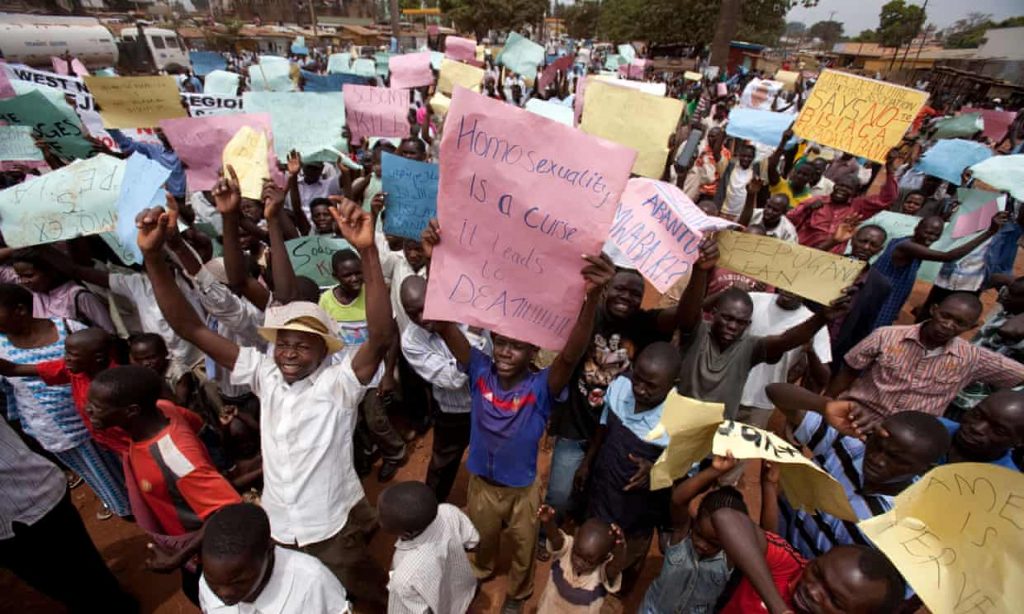This past Monday, 16 Ugandan LGBTQ activists were arrested at a sexual health organization on suspicion of engaging in gay sex–which is punishable by life imprisonment. The police cited condoms, lubricants, and anti-HIV medicines as evidence that the men were breaking the Ugandan law that “bans carnal intercourse against the order of nature” (Berger). The men, aged 22 to 35, were taken from their charity and subjected to forced anal examinations. According to the Human Rights Watch, “these examinations lack evidentiary value and are a form of cruel, inhuman, and degrading treatment that may in some cases amount to torture” (Ban). On Thursday, police spokesman Patrick Onyango reported that “based on the medical examination report, it was established that the suspects were involved in sexual acts punishable under the penal code,” and while it is currently unclear whether or not the men will appear in court, Uganda’s national police spokesman, Fred Enanga, said “the state attorney was considering the case before any court appearance” (Nairobi).
Uganda is a largely conservative Christian country, and their anti-homosexual beliefs can be traced back to laws enacted during the period of British colonial rule. The current Ugandan government, which has been led by President Yoweri Museveni since 1986, has a history of condoning extreme acts of LGBTQ violence and oppression. In 2014, the East African state received international pressure to nullify their “Kill the Gays” bill that made homosexuality a capital offense; however after Kenya’s high courts recently “rejected an attempt to repeal colonial-era laws criminalizing gay sex,” Ugandan MPs are working on reintroducing legislation that would make gay sex a capital punishment. MP James Nsaba Buturo said, “We are putting our [bill] together. Just give us a bit of time… We need a law that defends and protects our values” (Burke). Furthermore, on October 4th, an LGBTQ activist was bludgeoned to death, marking the fourth murder of an LGBTQ activist in this year alone. No police action has been taken to investigate these murders (Nairobi).
In this course, we have debated the state’s role in providing its citizens with certain political, civil, and social rights. While it can be argued that the Ugandan administration’s persecution of their LGBTQ citizens infringes on all three types of rights, the most obvious offense is with the lack of civil equality. Drogus and Orvis define civil rights as “those rights that guarantee individual freedom as well as equal, just, and fair treatment by the state.” Uganda’s government fails to provide its LGBTQ citizens with equal treatment. Freedom House, an organization that helps determine the number of political rights and civil liberties within a country, places Uganda in the “not free” category. Moreover, they received a 5 out of 7, with a higher score being worse, for their amount of civil liberties (Uganda). With no surprise, they also received the lowest possible score for the question: “Do individuals enjoy personal social freedoms, including choice of marriage partner and size of family, protection from domestic violence, and control over appearance?”
Uganda’s failure to provide these civil liberties has corresponded with an uptick in civil disorder. Asia Russell, the executive director of Health GAP, an organization that campaigns for HIV-medications, believes that the “police and the military are cracking down harder and harder on dissent. And at the same time, they are deploying a playbook of trying to scapegoat minority, [LGBTQ] communities” (Berger). The current situation in Uganda is not unfamiliar within the continent of Africa. In September of 2017, Egyptian police brutally suppressed citizens waving a rainbow flag at a music concert in Cairo (Nnaobi). This targeted attack against the LGBTQ community caused the Egyptian regime to lose both international and domestic legitimacy as it showcased their poor human rights record. Since then, Egypt has faced an increasing amount of civil unrest and international disapproval. These human rights violations are not specific to Africa, in fact, there are 68 other countries (Brunei, Iran, Singapore, Saudi Arabia, etc.) that also have laws that criminalize same-sex relations. If Uganda continues to try and limit their civil liberties and enforce human rights violations, then it will suffer similar, increasing sanctions from the international community as well as disapproval from within their community. These infractions can eventually lead to mass protests, riots, and even regime failure. Will Uganda’s incapability to provide all of its citizens with equal civil liberties inevitably lead to a regime change, or can a state overcome institutionalized inequality?
Bibliography
“Ban Forced Anal Exams Around World.” Human Rights Watch, 12 July 2016.
Berger, Miriam. “Uganda Arrested 16 LGBTQ Activists. Here’s Where Else Gay Rights Are a Battleground in the World.” The Washington Post, WP Company, 26 Oct. 2019.
Burke, Jason, and Samuel Okiror. “Ugandan MPs Press for Death Penalty for Homosexual Acts.” The Guardian, Guardian News and Media, 15 Oct. 2019.
Nairobi, Reuters in. “Uganda Arrests 16 LGBT Activists on Suspicion of Gay Sex.” The Guardian, Guardian News and Media, 24 Oct. 2019.
Nnaobi, Ifeatu. “One Year on from Rainbow Flag Arrests, Egypt Continues LGBT Crackdown.” Thomson Reuters Foundation. 24 Sept. 2019.
“Uganda.” Uganda | Freedom House, 8 Aug. 2019.


This is a great post. It’s clearly well thought through and articulated. I appreciate the extent of research that went in to this, even bringing in Freedom House scores for the analysis. The final question did leave me wondering: is this an issue of regime type? I think that anti-LGBT discrimination can exist in any regime (think of the US during the AIDS crisis). What seems the most influential factor here is how the courts influence government and society. If you were to analyze how regime factors into it, I would have liked to hear more on Uganda’s government and how that may explain why anti-LGBT legislation seems to be so successful despite international pressure.